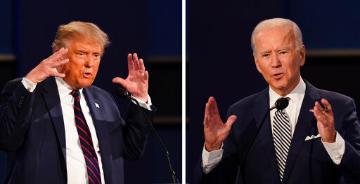
Patrick Semansky/Associated Press
John Pelissero is a senior scholar in government ethics at Santa Clara University’s Markkula Center for Applied Ethics and a professor emeritus of political science from Loyola University Chicago. He tweets from @1pel and views are his own.
The first presidential debate was more than a disappointing encounter between the two major candidates. It was a disastrous display of a democracy that seems to be at risk of devolving into chaos.
The 90-minute debate was characterized by Donald Trump bulldozing his way across Joe Biden’s time to speak, while spewing misinformation, distracting comments, and verbal attacks on his opponent’s character and family.
Biden responded with insults about the president’s character and fitness for office and went so far as to tell him to “shut up.”
Little discussion of policy positions was evident by either candidate in front of a national viewing audience of more than 73 million people. And this is what we got from the president of the United States and the former vice president of this country.
Last week we had the candidates at competing town hall meetings with no opportunity for voters to hear them respond to similar questions or to see if decorum would be restored with them on the same stage.
We need this week’s debate with the candidates side by side—with appropriate social distancing. Why? Because the fundamental purpose of political debates is to create an informed electorate. It is one of many tools for educating the public about candidates and their positions on issues. But it is the only forum that brings the political opponents into the same arena and allows the public to assess the candidates while they address the same issues posed by a moderator.
How might the next debate improve the overall experience for those voters still deciding for whom they will cast their ballots?
First, agree to follow the ground rules on time to answer and respond, showing respect for one’s opponent, and treating the process, the moderator, and the other candidate with civility.
One could say that there was agreement among the Trump and Biden campaigns to abide by the agreed upon rules and the candidates ignored these. True. We need stronger tools for compliance. A second suggestion is that the moderator must be empowered to enforce the rules through gentle reminders and forceful consequences.
If a candidate does not honor the ground rules by frequently interrupting, talking over the opponent, or injecting insults into the forum, the moderator must act. Candidates who repeatedly disrespect the rules should have their microphones muted, have their camera lighting dimmed, and lose speaking time on forthcoming question segments.
Third, require candidates to address the questions posed by the moderator (or audience in a town-hall format) and the responses of their opponents. Candidates should be held to a standard of fair and honest responses and provide substantive answers. If in the judgement of the moderator, a candidate is not being honest, fair, or substantive, then the moderator should call that out and if the response continues to fail the standards, then stop the candidate and move on.
Fourth, demand that the presidential candidates show respect for this critical process of educating voters. Although it is true that debate rules cannot change the predisposed behaviors of political candidates, including a propensity to be disrespectful in public settings, there should be consequences for such that will preserve the dignity of the forum.
Finally, the end game for these presidential debates is to educate the American electorate. By developing and implementing ethical rules for engagement, the public interest will be served.
We owe it to the American people to have more and better debates. It will provide an opportunity to instill confidence in the integrity of the U.S. electoral system. And it can show the world that this democracy is not bound for a chaotic demise.
